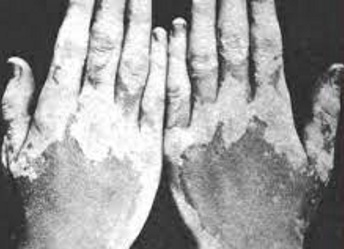Skin Disease

The skin of Henry Moss imperceptibly sloughed:
pink and white patches colonised his blackness,
tightly curled wool unravelled until
it was hard to distinguish stain from substance;
cotton flowering or negritude fading to an absence?
He came armed with letters of introduction
and documented lineage, to exhibit himself
in Philadelphia taverns, narrate bodily changes,
charge white folks a quarter to purchase his freedom.

“A Great Curiosity” ran the advertising puffs,
spectators pushed and shoved to swallow enough
to alter a complexion; speculators conjured up
remedies for darkness: purging, abstinence, fear
and bleeding, the juice obtained from unripe peaches,
friction from clothing, civilization.
And should black be turned white by manners
and trappings, what when white men marry the savage?
When frontiers are rolled ever further back
might white skin be overshadowed by black?
Among the observers was Benjamin Rush,
the Father of American Psychiatry.
Shying from the whip of slavery
while shrinking at the shape of equality,
for Rush, the transformation of Henry Moss
confirmed a racial and medical theory.
Like the Inquisitor trained to see heresy,
Rush saw disease in every direction
and diagnosed black skin as a symptom
of congenital leprosy. Henry Moss
was undergoing a spontaneous cure;
the negro was sick and deserving therefore
of humane treatment, though not emancipation;
his potential to infect posterity
earning him just a place on the bus,
but segregation in the bed chamber.
Raymond Miller
